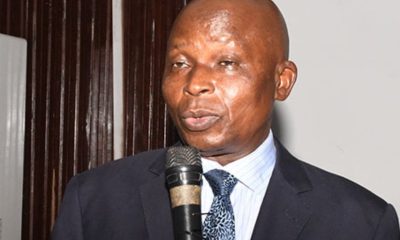News
Reps task CBN on access to N250bn gas expansion fund

The House of Representatives has urged the Central Bank of Nigeria (CBN) to remove bottlenecks preventing Nigerians from accessing the N250 billion gas expansion facility at the bank.
Rep. Benson Babajimi, the Chairman of the ad hoc committee on petrol price hike said this on Wednesday, when CBN officials appeared before the committee.
Babajimi said that the removal of the bottlenecks would cushion the effect of the removal of petrol subsidy on Nigerians.
“My point is that you oversight the commercial banks, you have the right and powers to remove bottlenecks.
“The information we are giving to you is that you go back and see how you can make the process seamless,” he said.
Responding, the Programmes Manager, CBN, Mr Clement Osawi, acknowledged that the bank had an intervention fund called Oil and Gas Stabilisation Fund.
He said that as a matter of procedure, most CBN interventions went through commercial banks to qualified beneficiaries.
Osawi said that the commercial banks had the responsibility to do the due diligence and feasibility studies on beneficiaries.
“From what you are saying, it is like a new venture where it is very difficult to assess the capacity of the person requesting for the funds.
“So the likelihood of them having access to large sums is very difficult; it is easier to give CBN funds to establishments with clear track records otherwise, CBN will be accused of just giving someone who is not doing anything with funds.
“For IPMAN to have mentioned it, they were informed that the facility exists; CBN can announce that there is a facility and ask commercial banks to send those qualified beneficiaries.
“You can stay for two years, they won’t send one; this is because having drafted the criteria, the commercial bank will tell you, we have checked this customer, we have checked the other customer, it is not okay,” he said.
Osawi, however, said that he would carry the message of the committee to the management of the apex bank for further actions.
Osawi blamed the current hike in petrol price on exchange rate and other factors playing out in the global oil market.
News
Woman killed while crossing road in Anambra

The Federal Road Safety Corps (FRSC), Anambra State Sector Command, has confirmed the death of a woman in an accident at Okpoko Market on the Asaba-Onitsha Road.
The Sector Commander, Mr Adeoye Irelewuyi, who confirmed the accident to journalists in Awka on Thursday, said that the woman was hit while she was crossing the road.
He said that the accident, which occurred on Wednesday, involved a commercial tow truck with registration number XA550BMA.
“Eyewitness report reaching us indicates that the truck was towing a vehicle in an uncontrollable speed along the axis.
“The vehicle that was being towed got detached from the tow truck.
“It hit and killed a female adult, who was said to be crossing the road, while the tow truck continued its movement.
“FRSC rescue team came to the scene and took the woman to Toronto Hospital, Onitsha, where she was confirmed dead and her body deposited at the hospital’s mortuary,” he said.
While sympathising with the family of the dead, the sector commander urged motorists, especially tow truck drivers, to exercise a high level of professionalism.
He also urged the drivers to always use standard equipment and avoid speeding.
News
LASG’s maize palliative impactful, says poultry association chair

The Chairman, Poultry Association of Nigeria (PAN), Lagos State Chapter, Mr Mojeed Iyiola, said the state government’s maize palliative to members of the association made a positive impact on the sector.
Iyiola said this in an interview with the News Agency of Nigeria (NAN) on Thursday in Lagos.
“We received about 150,000 tons of maize in February from the Lagos State government as palliative to cushion the effect of high feed prices.
“The major benefit of the palliative is that it actually cushioned the cost of production for most poultry farmers in the state.
“The palliative was beneficial as it made the cost of some poultry produce, especially eggs to drop,” Iyiola said.
He noted that prior to the palliative, a crate of egg was sold between N3,500 and N3,700 at the farm gate, but after the palliative, it now sells between N3,200 and N3,400.
According to the PAN chair, retailers and middlemen who sell from N3,800 to N4,200 do that for their personal gain.
“We have urged our members to sell their eggs at reasonable prices following the receipt of the palliative from the government.
“We appreciate the Lagos State government for the palliative but we also urge the federal government to do likewise, to further reduce the cost of production in the sector.
“This will consequently lead to drop in the prices of all poultry produce across board,” he said.
He said the palliative was shared among financial members of the association at no extra cost.
“As an association we shared the grains equally across PAN’s eight zones in the state equally. We also mandated each zone not the sell even a grain of the maize.
“We, however, considered new poultry farmers who wanted to the join the association as beneficiaries of the palliative,” said Iyiola.
He noted that through the palliative, more poultry farmers were recruited into the association.
“The maize was shared only to poultry farmers and not feed millers, it is the major component of poultry feed formulation,” he said.
-

 News5 days ago
News5 days agoBDCs now buying dollar at ₦980 — ABCON President
-

 Business5 days ago
Business5 days agoSeplat Energy celebrates a decade of Dual Listing with Bell Ringing Ceremony at Nigerian Stock Exchange
-

 Metro5 days ago
Metro5 days agoOsun Poly Student, Olanrewaju Olatona killed by hit-and-run one-way driver
-

 Headline5 days ago
Headline5 days agoFagbemi warns against obstructing EFCC from performing its lawful duty
-

 News5 days ago
News5 days agoLASG’s maize palliative impactful, says poultry association chair
-

 News5 days ago
News5 days agoWoman killed while crossing road in Anambra












